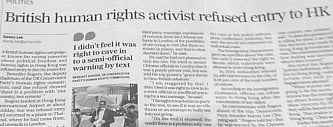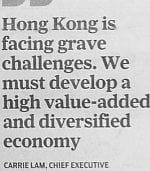 And the numbers are in… Hong Kong Chief Executive Carrie Lam’s full Policy Address mentioned ‘Belt and Road’ 33 times, and ‘Bay Area’ 29 times. No wonder the lady read out an expurgated version to the Legislative Council. She also paid box-ticking homage to Beijing by making the obvious correct noises about dreadful pro-independence rabble, the need to cram patriotism into school kids and other forms of Motherland-adoration. As Disraeli said, lay it on with a trowel.
And the numbers are in… Hong Kong Chief Executive Carrie Lam’s full Policy Address mentioned ‘Belt and Road’ 33 times, and ‘Bay Area’ 29 times. No wonder the lady read out an expurgated version to the Legislative Council. She also paid box-ticking homage to Beijing by making the obvious correct noises about dreadful pro-independence rabble, the need to cram patriotism into school kids and other forms of Motherland-adoration. As Disraeli said, lay it on with a trowel.
The rest of the content was mostly standard Policy Address blather, but obviously in a softer and more caring style than her baleful and emotionless predecessor CY Leung would have managed.
So you’ve got your usual pointless welfarish handouts, like a small de-facto cut in public transport fares. You’ve got the chucking of taxpayers’ money at the mystical tech-R&D-innovation fetish. (There’s also plenty of hot, steamy ‘hub’ action – she uses the word 21 times, and announces the exciting discovery of a new one called the Qianhai HK-SZ Design Innovation Hub.) There’s some bureaucratic re-structuring and committee-founding, which Carrie really gets off on. Various municipal measures, with a pedestrianized street here (maybe) and a community garden there (probably). And a big headline for the business press in the form of a cut in profits taxes.
 If (which is unlikely) anyone really thought Carrie was serious about housing, they now know better. She is scrabbling around for some short-term fixes to get a few slum-dwellers into charity-rented apartments, converted non-residential buildings and (not that we’re desperate) shipping containers. The supposedly Big Ideas are limited in scope and/or scale and essentially involve re-categorizing existing resources and incentivizing/luring/conning renters into ownership.
If (which is unlikely) anyone really thought Carrie was serious about housing, they now know better. She is scrabbling around for some short-term fixes to get a few slum-dwellers into charity-rented apartments, converted non-residential buildings and (not that we’re desperate) shipping containers. The supposedly Big Ideas are limited in scope and/or scale and essentially involve re-categorizing existing resources and incentivizing/luring/conning renters into ownership.
Needless to say, she does not even mention the demand side of the equation – the influx of Mainland migrants and money-launderers underpinning rising rents and developers’ margins. To ignore that is to keep the housing problem permanent by design. With that aim in mind, like its predecessors, the administration will also spare no effort to ensure that the all-important ‘shortage of land’ continues.
Other slightly-noteworthy observations from yesterday’s excitement…
Interestingly, Carrie equates political reform with Article 23 national security laws in terms of feasibility. (That’s a ‘no’, obviously.)
And she did a reasonable job in terms of presentation, though coming after the malevolent and gruesome CY, it’s not saying much. The ‘Hong Kong people are still brilliant’ line was a nice try, at least. She also seems less petrified than in the months before her appointment – almost as if there isn’t someone sticking a gun in her back now.
Still, the basic message is plus ca change.
You have a choice: you can either prioritize pushing prices and rents up to channel wealth into the pockets of a bunch of 88-year-old tycoons, or you can have a vibrant, diverse, innovative economy with opportunities for the many. You can have one; you can have the other. You cannot have both.
I say you have a choice. Of course, Carrie Lam – appointed by the Chinese Communist Party – does not.
 Amid the Policy Address hoo-ha, a party pooper strikes in the form of a UK politician called Benedict Rogers turned away by Hong Kong Immigration. This might have something to do with the extra-cautious hyper-paranoid freak-out precautions ahead of the 19th Party Congress in Beijing. Or it could just be the post-Umbrella Movement rectification norm. Either way, it would happen more often if more overseas critics cared enough about Hong Kong to try to visit.
Amid the Policy Address hoo-ha, a party pooper strikes in the form of a UK politician called Benedict Rogers turned away by Hong Kong Immigration. This might have something to do with the extra-cautious hyper-paranoid freak-out precautions ahead of the 19th Party Congress in Beijing. Or it could just be the post-Umbrella Movement rectification norm. Either way, it would happen more often if more overseas critics cared enough about Hong Kong to try to visit.


Your point about the 150-200 mainland immigrants per day and supply/demand on housing is well made. Surprised that more activists have not made the same point about the unstoppable rise in rents and property prices.
What were readers favourite big fat whopping porkies Carrie spouted yesterday ? Mine were;
1. Article 23 now equates to Global Terrorism ? Now we all know about the foreign agents, who organized and funded OCLP, and the utter wanton carnage and destruction they caused in trying to establish a Caliphate in Harcourt Road, but I think, it’s more to do with CCP insecurity, paranoia and control ?
2. “Having campaigned in an election” When ? For the love of god she’s not suggesting the Chief Executive selection (by the CCP) was an election ?
3. “Very respectful towards the Legislative Council” Did she not notice the several empty seats formerly occupied by (mostly) democratically elected Legislators that the Government, in which she was the Chief Secretary, disqualified ?
Mrs. Lam should cut the profits tax and the salaries tax to 10% and then take the rest of the year off.
Probably – It has been repeatedly reported in the press that most of the 150 daily Mainland migrants come here for “family reunions”. I guess that means spouses and children moving here to join family members that already have a place to live. Therefore, it seems that most of them are not directly increasing the demand for housing. Also, you don’t need to be a migrant to purchase/rent property here.
Anyone know the statistics regarding net flow of non-Mainland immigrants into or out of Hong Kong in recent years? It seems to me that many of these people are more likely to need a place to live when they arrive, and perhaps they are responsible for pushing up the private housing rental market.
As there are not large numbers of homeless people living on the streets here, Hong Kong does not seem to have a shortage of housing. What it does have are shortages of space and good real estate investment opportunities. What it lacks is a universal pension scheme that causes people with capital to look for investments that generate income.
“CCP insecurity”.
You’re being redundant.
It probably says something about my extremely low expectations that I’m somewhat…heartened (?) to see municipal stuff finally getting some attention. Normal cities have mayors to deal with the nuts and bolts of running a city as a physical place, but it’s all been on auto pilot since Old Man Tung demolished the Urban Council.
As for the housing, has any administration in the entire history of Hong Kong ever
a) tried to unspool the property spiral, and
b) not failed miserably?
Not a rhetorical question. Really asking.
@Cassowary
a) No, so
b) moot.
I notice that the human right’s activist’s rebuttal made the international press at least in the Guardian, but that Carrie’s speech, ahem, didn’t….
Just watched the Eminem video, shredding Trump. Cool shit.
Oh, and another prominent GOP senator (Ben Sasse) just told Donald where to shove it.
@A Poor Man – first of all, HK doesn’t select the arrivals, so we don’t know if the 150 are all genuine family reunions or if Beijing is taking the opportunity (as some have suggested) to slip in a steady flow of CCP agents. Secondly, if a single person here suddenly has a spouse and maybe children to accommodate, they will usually need a bigger space, so there is obviously some impact on the housing market.
Furthermore, the absence of street sleepers doesn’t tell us how many people are living in shoeboxes (cage homes or subdivided flats) because they can’t afford a decent home.
Old Newcomer – I acknowledged in my original post that HK has a shortage of space, but should have elaborated that I do believe that many people here live in substandard conditions. However, I also realize that it is human nature to want more for less. Therefore I think there is not much the government can do because of its stated current free market philosophy.
People overlook that one of the big reasons for housing being so expensive in HK is high construction costs. Why are construction costs so high here? Because most young people (and their parents) would rather try to sell insurance policies than do hard physical labor. I am no apologist for the local government (in fact I can’t stand it), but realistically I don’t think there is not much it can do. It would be dammed if it allowed more “low skilled” migrant workers, especially if they were from the Mainland. This lack of labor also contributes to long project development times. It would be impossible to build 100K flats per year, unless all other construction projects in the city were suspended.
Why do Mainlanders save so much of their money? Because they know they can’t count on the government to provide services for them in an emergency. HK people tend to think the same way when it comes to their old age. They want to own income generating housing for security and peace of mind.
Sorry, my last sentence should have ended with: and are willing to pay high prices and accept low rates of return.
@ Chris: Then why the hell should anyone expect Carrie to do it?
Anyway, we’re overdue for another property crash. We’ll probably get one if the lunatic in the White House appoints an interest rate hawk to the Fed.
@Poor Man, there is something the government can do under free market economics and that is to limit the daily influx of mainlanders. It is basic supply/demand economics that dictates a limited supply (housing) with an increased demand (population) will drive prices, whether sale, rental or cage apartments skywards. A government representing HK people would address this with all due alacrity to justify it’s role in serving the population but is currently supine on the subject.
As the last 48 hours have shown, HK is no longer in control of it’s own borders.